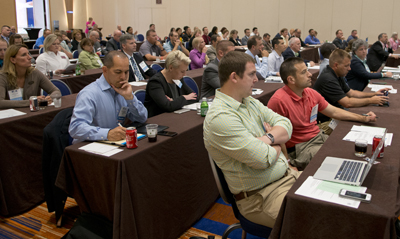Dec 21, 2017Maximizing Meetings: Part 2

Last week, we talked about how to hold productive meetings (you can read the blog here). This week, we get into how to maximize the meetings you have with various stakeholders. Below are some sample athletic training meeting scenarios and some thoughts on maximizing each one.
Meeting with Athletes: Student-athlete meetings are some of the most important meetings the athletic trainer has. Earning the trust of the student-athlete is vital, so these meetings are very important to plan for. They should take place in private because the topic of discussion may be confidential relative to physical or mental health, drug testing results, or other similar subjects. This type of meeting requires information, perspective, and empathy for the student-athlete.
Meeting with Coaches: Whenever I was involved in a coaches meeting — either on a daily injury report or in consultation on an injury — I tried to be fully prepared to discuss the nature of the injury, provide a general timeline of next steps, and anticipate follow-up questions by the coach. I tried to weave in answers to potential questions or action plans I anticipated from the coach into my initial narrative, thus saving the coach excessive follow-up questions. These tactics made the meetings go smoother and reduced confusion.
Some athletic trainers are compelled to attend and participate in meetings regarding injuries in the clinical setting. If delivering a daily injury report to a group of coaches at the daily coaches meeting, arrange to go first on the agenda and then leave the meeting. There is little need for an athletic trainer to listen to recruiting assessments or game strategy for the upcoming weekend. This way, the athletic trainer can return to their duties in the athletic training facility
Meeting with Administrators: Administrators also request meetings, usually over a budget, personnel issue, student-athlete behavioral issue, or a medical decision of which they are hearing complaints. Again, having your facts straight, clearly articulating those points, and having an open mind regarding the methodology and not the medical decision made by the medical staff are helpful.
Meeting with Parents: Parents are entrusting the care or education of their son or daughter to you. In some instances, emotions can run high, and whenever emotions are not modulated, misunderstandings can occur. Whenever meeting with parents, it is important to listen to their concerns and clearly state the facts, while displaying genuine empathy for their viewpoint.
Meeting with Staff/Faculty: Full staff and faculty meetings can be tedious or productive, depending on how you approach them. Large, general meetings involving entire staffs should be minimal, as there are too many people who can lose their attention if the meeting material is not compelling or interesting.
As head athletic trainer, and now as director of an athletic training program, I generally do not hold regular weekly meetings. A good leader I have found already spends a portion of their day meeting individually with staff/faculty or students, usually informally, in order to understand the morale, issues, and opportunities of the department that one-on-one short meetings can achieve. When held, weekly staff or faculty meetings should be kept to 30 minutes, with an agenda and action plans assigned to individuals for follow-up by the leader in order to make meetings productive.



